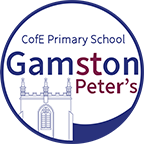Maths
At Gamston St Peter's CofE Primary School, we are dedicated to fostering a deep appreciation for mathematics among our pupils. We recognise the importance of mathematics in the wider world and strive to equip our pupils with the confidence to apply their mathematical skills and knowledge in various contexts throughout their lives. Our aim is for all pupils to enjoy mathematics, experience success, and develop their ability to reason mathematically.
Our Aims:
We align our teaching with the national curriculum for mathematics, which aims to ensure that all pupils:
-
Become Fluent:
- Develop fluency in the fundamentals of mathematics through varied and frequent practice with increasingly complex problems. This will enable pupils to build conceptual understanding and recall knowledge rapidly and accurately.
-
Reason Mathematically:
- Follow lines of enquiry, conjecture relationships and generalisations, and develop arguments, justifications, or proofs using appropriate mathematical language.
-
Solve Problems:
- Apply their mathematical knowledge to a variety of routine and non-routine problems with increasing sophistication. This includes breaking down problems into simpler steps and persevering in seeking solutions.
Calculation Policy:
Our calculation policy is collaboratively developed with all staff to demonstrate the methods appropriate for different age groups. It begins with the use of manipulatives and pictorial methods, progressing to formal written methods. This policy ensures consistency in teaching across the school, allowing pupils to build on their prior learning confidently. Mastery of problem-solving methods is crucial for our pupils' success.
White Rose Maths:
We utilise the White Rose Maths approach, which provides resources and schemes of learning for all ages. This approach ensures that all pupils have equal opportunities to learn, with a strong emphasis on basic skills and clear progression steps. Pupils are taught to count in steps, learn facts by heart, and apply their skills in various contexts, making connections between concepts and developing efficient strategies for mathematical calculations.
Assessment is integral to our strategy, enabling pupils to track their progress and allowing for immediate intervention to address misconceptions.
Implementation:
At Gamston, we strive to deliver mathematics in a fun and engaging manner. Our Long Term Plan ensures that staff deliver a curriculum that builds on existing skills year on year.
-
Active Participation: Each child is encouraged to engage at their individual level, using mathematical vocabulary to discuss their work, supported by staff modelling.
-
Regular Reinforcement: Pupils revisit different areas of mathematics frequently, ensuring constant reinforcement and ample opportunities to apply their skills.
-
Interactive Starters: Each lesson begins with a mental starter that may include recall of facts or existing skills, often presented in a game format to encourage active participation.
-
Skill Development: Lessons include clear modelling of skills, followed by practice in various ways, progressing to reasoning and problem-solving tasks.
-
Resource Utilisation: We incorporate Abacus and Power Maths resources to enhance learning, alongside practical equipment that pupils can choose to use during lessons.
-
Feedback and Intervention: Pupils receive timely feedback (both verbal and through 'fly marking'), with interventions implemented as needed to clarify misconceptions or correct errors.
Impact:
At Gamston, we cultivate a love for mathematics among our pupils, who articulate their enjoyment and understanding through pupil voice initiatives. They recognise the relevance of mathematics in the modern world and build upon their skills year on year.
Our supportive ethos encourages the development of collaborative and independent skills. Regular assessments inform our teaching and interventions, ensuring each child’s success. The teaching of mathematics is monitored through observations, learning walks, and the review of pupils' work, with the expectation that the majority of pupils will achieve age-related expectations.
